Fracking
Building Momentum in Mansfield
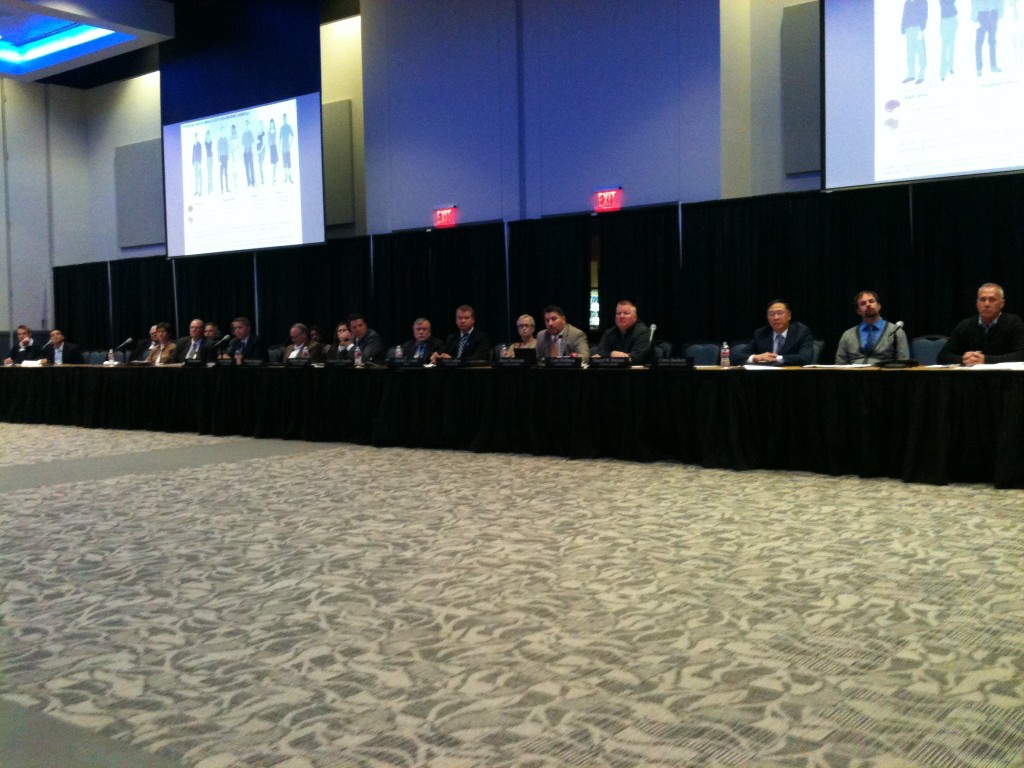 Good things come in threes. Lance Irwin, Erick Orsak, and Tamera Bounds proved that again on Wednesday night when they led the Mansfield Gas Well Awareness contingent during the Mansfield City Council's "work session" on rewriting the city's gas drilling ordinance.
Good things come in threes. Lance Irwin, Erick Orsak, and Tamera Bounds proved that again on Wednesday night when they led the Mansfield Gas Well Awareness contingent during the Mansfield City Council's "work session" on rewriting the city's gas drilling ordinance.
Combined, they projected just the right mix of competence, skepticism, and experience to combat the "Don't worry, be happy" approach of the Railroad Commission and Texas Commission on Environmental Quality presentations that preceded them in the agenda.
(By the way did you know, that according to Austin, the average response time of a TCEQ inspector responding to a complaint was only 5 hours? Downwinders at Risk is willing to pay $100 to the charity of the inspectors' choice if anyone out there has ever gotten a response that quickly. After almost 30 years of dealing with state environmental agencies, we can't recall a single instance where it took less than a day for an inspector to show up, even when the situation was "urgent.")
By putting the three residents in the same horseshoe as industry, state agencies, and itself, the Council elevated the status of the resident's group beyond anything it had enjoyed in previous rounds of jousting over drilling. Whether that leads to the kinds of substantial changes to the city's drilling ordinance the group is pursuing remains to be seen.
What was obvious after the formal presentations ended and a more informal question and answer period followed was the large disparity in monitoring and self-regulation within the industry. There were at least 10 or 12 gas operators sitting at the table during the event. Conspicuous by its absence was Eagleridge, the source of many complaints in Mansfield and of course, the company that ignited the Denton fracking vote controversy.
But Eagleridge's Chief Operating Officer Mark Grawe was present, in the back of the room, trying to keep a low profile. It didn't work. Let's just say when you get called on the carpet by Stephen Lindsey, the Mansfield Council member whose day job is the "Government Relations and Community Affairs Director" for gas industry giant Quicksilver, you know you're not going to have a good night. As the evening wore on, it was clear Eagleridge was being portrayed as the poor, white trash cousin of the more established players like XTO and Chesapeake. The company lacked the remote sensors, automatic cut-offs, and other kinds of precautions that the rest of the industry reps liked to brag about. By the end of a rigorous cross-examination of Grawe by the residents' group, there was an unacknowledged consensus that perhaps the floor for regulating existing wells needed to be raised in Mansfield so that moving target known as "industry best practices" was updated applied to all.
More ambiguous was the response to the residents' request for a 1500-foot setback to replace the current 600 feet requirement – with a variance that can decreases that distance to 300 feet. Some industry representatives and council members want to frame the problem in terms of incidents and accidents that can be fixed with better equipment, rather than systematic changes that require separating people from heavy industrial activity, no matter how good the intentions are.
Also left hanging was how to better regulate polluting compressors. The city's lawyers, who've written protective ordinances for Dish and Southlake, was more circumscribed with their Mansfield employers. Cities can't regulate pipelines and mid-stream compressors for "safety standards," already addressed by the Railroad Commission they said. Left unsaid was that cities can and have regulated compressors for noise and "odors," otherwise known as toxic chemical exposures.
Bounds presented the city council with what she called a model ordinance that combined the best, most protective aspects of drilling regulations from DISH, Southlake, Dallas, Denton, Arlington and even Fort Worth. Saying these were legal requirements that hadn't been challenged by industry and so were available for adoption by the city, Bounds put the council on the spot by saying Mansfield needed to protect its citizens at least as much as these other municipalities and had no legal excuse for not doing so. Mayor David Cook took note of the work she'd done in compiling the new ordinance and said the city would perform its own side-by-side comparison and come back in January to continue the discussion.
Overall, the mood of the evening was cautious but positive. It was hard not to be impressed by the residents' knowledge and expertise, and everyone was civil in public. Afterwards, however, one of the first things Bounds heard was an industry operator telling her there was no way he was going to accept a 1500-foot setback. There is still plenty of work to be done. But it was a step in the right direction. And there are no big changes without incremental changes first.
It helped that the media were out in force, trying to identify the next fracking hotspot after Denton. There was a row of TV cameras and local and national print reporters showed up to take notes. Channel 8 had the best coverage of the evening, and if you can get past the paywall, here's the Star-Telegram's take.
As has been noted before, Mansfield is no Denton. It's not even Southlake or Flower Mound. It resembles Ft. Worth more than it does Dallas in terms of politics and attitudes toward the gas industry by the Powers That Be. It has more wells per capita than just about any place else in the Shale. But those are all reasons that make it worth fighting the good fight there. If residents can make their case effectively and change their situation in Mansfield, then there really is hope for everyplace else in the Barnett. Stay tuned.
Make Your Butt A Force for Good Tonight
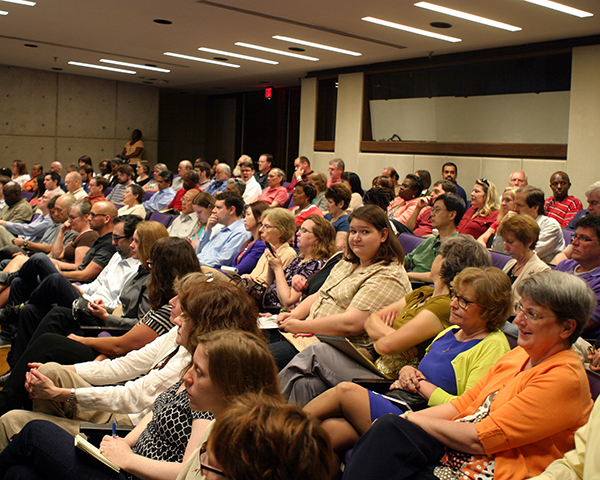 Woody Allen is famously credited with the line that "showing-up is 80% of life." With organizing, it's more like 90%. There are at least two places to be tonight where just your butt in a seat will make a huge, positive difference:
Woody Allen is famously credited with the line that "showing-up is 80% of life." With organizing, it's more like 90%. There are at least two places to be tonight where just your butt in a seat will make a huge, positive difference:
1) Mansfield City Council Work Session on a New Gas Drilling Ordinance, 6 pm, Mansfield Performing Arts Center Workroom, 1110 West Debbie Lane, (near Hwy 287 – just south of I-20) (map).
After almost a year of struggle, residents of Mansfield are getting a hearing tonight in front of their city council. Unfortunately, the council, including two members who make a living from the gas industry, are making the the residents take on the Texas Commission on Environmental Quality, the Texas Railroad Commission, 10-13 gas industry representatives, pro-industry state representatives, senators, and Congressman, as well as their own city staff – all in one evening. They're besieged, and they really need your help tonight.
We have it on good authority that the Mansfield Mayor is using this set-up to "gauge public opinion on the issue" even though members of the public won't get to speak. So it's all about attendance – butts in seats.
Mansfield isn't Dallas. It isn't Denton. It's not even Southlake or Flower Mound. It's deeper into the Shale, more blue collar, and more pro-industry than any other city that's been challenged over their old drilling ordinance in the last several years. The city has more gas wells now per capita – over 200 in a city of 60,000 – than just about any other place in North Texas – with a potential for 300 more. Concerned residents are at a disadvantage in trying to change the status quo.
Just your being there in a seat tonight sends a message you care about this issue. And if you live in Tarrant county or any place else where there's gas drilling in the Metromess, it's in your own self interest to help them in Mansfield. A victory there will make it more possible to win in other places. It will mean less air pollution from their wells and compressors blowing downwind. It will mean the tide is moving further west.
So do yourself, the region, and the cause a favor and show up tonight. You don't even have to speak. You just have to be present to win.
2) Trinity Toll Road Debate – 6:30 p.m. at Rosemont Elementary School, 1919 Stevens Forest Drive (map)
State Representative Rafael Anchia is sponsoring this debate over this leftover 20th Century boondoggle that features almost all the major players on both sides of the issues – Michael Morris, Mary Suhm, Patrick Kennedy and Scott Griggs. Again, your presence sends a valuable signal – that you're opposed to this floodplain toll way, and that this will be an important issue in the May Dallas elections. Go and be active members of the peanut gallery – cheer on the opponents, jeer the supporters.
It's particularly important that the public show increased interest tonight as Suhm and Mayor Rawlings conspire to muddy the waters with a new "review" of the plans of the road. They hope to give Citizen Council-backed candidates in the May election a way out of a simpey yes or no answer to the Toll Road – by saying their waiting for the review. You need to make sure they get the message that nobody is falling for that ruse.
Your butt can be a powerful voice for change tonight, or it can sit on the couch. Get out and show-up.
North Texas Fracktivists Unite! You Have Nothing to Lose But Another Bad Drilling Ordinance

Mansfield City Council Work Session on a New Gas Drilling Ordinance
6 pm, Wednesday, December 3rd
Mansfield Performing Arts Center workroom
1110 W Debbie Ln, Mansfield, TX 76063 (map)
Denton's successful citizens revolt is off the streets for now and in the courts. The next organized front in the battle over urban gas drilling in DFW is the Fort Worth suburb of Mansfield. And this next Wednesday, December 3rd, beginning at 6 pm, hard-pressed residents there need your help in turning the tide.
In response to months of grassroots effort on the ground, and only after the very first presentation by a physician on the medical consequences of fracking, Mansfield's city council has called for a "work session" to "discuss" changing its circa-2009 drilling ordinance for next week.
Only this work session is designed to shut down the residents call for reform. The city is inviting
– The Railroad Commission
– The Texas Commission on Environmental Quality
-All local elected officials ( Joe Barton, Bill Zedler, Rob Orr, Jim Pitts, etc)
– All 12 gas operators with wells and/or compressors in town, including Eagleridge, Exxon-owned XTO, Chesapeake, Atlas, Devon and Enervest.
These "stakeholders," along with city staff and city council will be given 15 minutes to make the case that the status quo is just fine. And oh yeah, then the residents group – Mansfield Gas Well Awareness – will get their 15 minutes to rebut the previous 90 minutes. No "outside groups" like ShaleTest or Downwinders – are allowed to participate or aid them.
What began as a simple request by the residents to meet one-on-one with the mayor has now blossomed into this huge conflagration where the city hopes to overwhelm the local group. It's in the self interest of everyone concerned about clean air and citizens rights and good government and fracking to prevent that by showing up in support of change on Wednesday night.
Even if you don't live in Mansfield, you have a dog in this fight. The air pollution from those Mansfield wells and compressors ads to downwind smog and toxic air pollution that residents in Arlington and Fort Worth and places further away breathe.
Progress in Mansfield means progress is more likely in other places in the Shale. A victory there means we advance a new, better model for regulation further west. Mansfield has more wells per capita than almost anyplace else in North Texas, over 200 now in a city of just 60,000 with the potential for another 300. Like other Tarrant County cities, it got hit early and hard by the Boom. Its drilling ordinance was written in 2008-2009, and based on – what else? – Fort Worth's model of 600 foot setbacks. This is a chance to bring the newer, more protective Dallas-Southlake-Denton model deep into industry-friendly territory.
Showing up next Wednesday means you're saying no to the bullying tactics the Mansfield city government are using to silence local residents. Just like corruption and gas drilling went hand in hand in Dallas, so it is in Mansfield, with no apologies for using a gas industry spokesperson as the city's main negotiator for gas drilling issues.
Two of its seven city council members have direct ties to the gas industry and obvious conflicts of interest over gas drilling decisions for the city. But one of them, Stephen Lindsey, is the Mansfield city council's point person for all things gas related despite, or because, of his job as "Government Affairs and Community Relations Director" for Quicksilver Resources, the sixth largest operator in the Barnett Shale. We've written extensively in this blog post about Lindsey's national role as an industry expert in "managing" local opposition to drilling. The guy is an industry PR troubleshooter and he's now personally directing Mansfield's response to the resident's request that the city update its ordinance.
Mansfield residents are besieged. They need your help. They need your butt in a seat on Wednesday night at the "work session." It's no coincidence this session is happening now, as the holiday season begins. The Powers That Be are hoping it wil get lost in the shuffle. Don't let that happen. If you want to see the legacy of the Dallas victory extended, if you want to see Denton's hard-fought victory pay-off elsewhere, please be at this Wednesday night showdown in Mansfield. It's the next hotspot for change, and we can't get it done without your active support.
Mansfield City Council Work Session on a New Gas Drilling Ordinance
6 pm, Wednesday, December 3rd
Mansfield Performing Arts Center workroom
1110 W Debbie Ln, Mansfield, TX 76063 (map)
“I’m on Both Sides of It.” Mansfield City Councilman Stephen Lindsey Has the Worst Conflict of Interest in the Barnett Shale
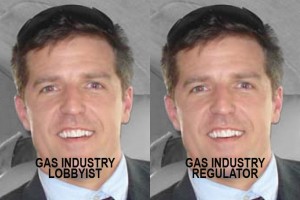 Stephen Linsdey is an entrenched member of the oil and gas industry. In the mid-Oughts he worked for Flowserv, the multinational manufacturer of valves and pumps used at thousands of oil and gas facilities worldwide. From 2007 to 2008 he was put in charge of protecting and developing Iraqi oil fields during the Iraq War. Beginning in 2008, just as the local Shale boom was taking off, he went to work for Quicksilver Resources inc, the sixth largest producer in the Fort Worth Basin, where he's been ever since, serving as Senior Director Of Government Relations and Community Affairs.
Stephen Linsdey is an entrenched member of the oil and gas industry. In the mid-Oughts he worked for Flowserv, the multinational manufacturer of valves and pumps used at thousands of oil and gas facilities worldwide. From 2007 to 2008 he was put in charge of protecting and developing Iraqi oil fields during the Iraq War. Beginning in 2008, just as the local Shale boom was taking off, he went to work for Quicksilver Resources inc, the sixth largest producer in the Fort Worth Basin, where he's been ever since, serving as Senior Director Of Government Relations and Community Affairs.
According to the company's job description, Lindsey's responsibilities "include community relations, municipal/city engagement, governmental/legislative affairs, regulatory/permitting, external affairs and corporate/public relations." He's also Treasurer of Quicksilver's Political Action Committee, overseeing the distribution of thousands of campaign contributions to officials such as Arlington Mayor Robert Cluck, Fort Worth Mayor Betsy Price, Railroad Commissioner Barry Smitherman, and Texas House Representative Jim Keffer, Chair of the House Energy Committee.
Lindsey's job is to smooth over any regulatory obstacles in the way of Quicksilver's production goals. He's the company's lead negotiator with local and state governments. He also is in great demand on the oil and gas industry speaker circuit as an expert on how to deal with what he says are those "working against industry's interest."
In his own words, "My role in my organization is to make insure the guys that want to drill wells and complete wells, and run pipelines, and put in surface equipment, and move trucks can do it uninhibited. Can do it without fear their permits are gonna get denied, or the regulatory structure is going to come down on them."
That's his day job. But Stephen Lindsey is also a Mansfield City Council member. In fact, as coincidence would have it, he's the city council member the Mayor has put in charge of overseeing the city's gas drilling policies.
And now, he's the city's go-to guy for the re-examination of Mansfield's obsolete 2008 gas drilling ordinance that's been the subject of a steady grassroots campaign of determined residents. You got a problem with that?
As it turns out, Lindsey isn't even the only member of the Mansfield city council who's intimately connected to the oil and gas industry. Larry Broseh is president of a drilling parts manufacturer whose clients include gas patch operators all over the state, including the Barnett Shale. That's two out of the seven city council members who have a pretty big conflict of interest.
But it's not just who Lindsey works for that makes for the outrageous double duty. It's what he does for Quicksilver. He's the slick PR guy that interfaces with local city councils to downplay the hazards of fracking in order to win permits. He's the spokesperson in the media. If Quicksilver had wells in Mansfield (the closest ones are in Arlington), the council would be sitting across the table from Stephan Lindsey. And as a national poster boy for fracking's public relations strategies, he's often the friendly face of the industry across the country. He's certainly fracking's most high profile elected official in the Barnett. And he wants you to know he's sincere about trying to get "the best product" i.e the best conciliatory agreements between industry and government.
With only 60,000 residents, but over 200 wells and another 300 potential ones to come, Mansfield has twice as many wells per capita than Denton and almost a third more per capita than even Fort Worth. Residents there are pressing to replace an industry-blessed "Fort Worth model" 600-foot setback (that's really a 300 setback with variances) with a "Southlake/Dallas model" 1500-foot setback minus any variances. Outside of Denton, now in court over an outright ban on fracking, Mansfield is the next battleground in the Barnett Shale for the clash between these two competing regulatory templates.
Lindsey is well aware of this clash. Part of his job is going around the country warning industry about the growing power of local governments in regulating drilling. He cites Flower Mound and Denton as bad examples. As one industry conference panel moderator posed it to Lindsey, "What's your advice on how to prevent a Denton?"
According to Lindsey, "local governments are increasingly at odds with state government." Cities don't feel as if they're protected by state entities like the Railroad Commission or TCEQ anymore. "Detrimental regulations" by municipal governments are on the rise. When older white Republicans are opposed to you, "that's a sea change."
Much to Lindsey's chagrin, unlike Colorado, where the Attorney General has taken local county governments to court because of this overreach, Texas home rule cities "can do whatever they want." If the cities think it's in their best interests, those regs "are going to stand" unless they're challenged. You can almost taste the anticipation he has over the lawsuits the Denton fracking vote has generated as a chance to settle the score and cut the cities down to size.
In his presentations to industry peers, Lindsey boosts about his role as a Mansfield city council member. "I'm on both sides of it. I'm out lobbying, er, presenting at City of Fort Worth, City of Arlington, City of Haslet, City of Southlake, City of Northlake – all of our operational areas, trying to get our permits approved and on the other hand, I'm sitting on our own city council listening as XTO, and Chesapeake, and other operators come in and present there."
Traditionally, the strictest interpretations of conflict of interest have meant that the elected official or a close relative had to have worked for or owned stock or or percentage in the specific company being discussed. Since Quicksilver doesn't have any wells in Mansfield, Lindsey passes that test. But in terms of a more general conflict over the escalation of local regulation of the gas industry, his positon in Quicksilver and as an industry spokesperson certainly does pose a conflict.
He doesn't hesitate to describe threats to the industry as a whole, or to advise other companies on how to "manage them." No matter how much more protective to public health it might be, wouldn't the spread of a Dallas-like model of "detrimental" regulation of drilling to a place like Mansfield be a bad precedent for the industry as a whole? Wouldn't it constitute a threat to other operators like Quicksilver, whose own future wells might be targeted next in Arlington, or Haslet, or God forbid, even Fort Worth?
If he was being honest, Stephen Lindsey the industry lobbyist would have to say yes. After all, as he noted to a Colorado reporter in an article over a local County's demand for a monitoring water well Quicksilver didn't want to install, "We’ve got to make prudent decisions about what option is best for the company."
In 2010, the City of Fort Worth Ethics Committee ruled that three gas company employees had a conflict of interest in serving on its air quality study committee by concluding, "The level of their loyalty to their employers has put them in a position of wearing two hats."
The same is true of Stephen Lindsey. Mansfield residents shouldn't have to guess which hat Lindsey is wearing when he's working as a city council member, or whether he's putting their well-being or the industry's bottom line first.
(Most of the quotes used in this post come from a presentation for the American Business Confernce in October, avaialble for viewing online: http://vimeopro.com/lbcg/fe14/video/108496562)
Before the Votes are Even Counted, Has Industry Already Lost in Denton?
 Because there's been no public polling, it's impossible to know which side is leading in the Great Denton Fracking Vote of 2104 going into Election Day. Indications here and there in news coverage give hints that internal polling by industry shows them behind. But before the count begins tonight, one gets the feeling that even if the fracking industry wins, it still loses – that this will be a totally Pyrrhic victory.
Because there's been no public polling, it's impossible to know which side is leading in the Great Denton Fracking Vote of 2104 going into Election Day. Indications here and there in news coverage give hints that internal polling by industry shows them behind. But before the count begins tonight, one gets the feeling that even if the fracking industry wins, it still loses – that this will be a totally Pyrrhic victory.
It has only itself to blame. It raised the stakes so incredibly high, went so over-the-top in its opposition, that even those who might sympathize with some of its arguments can't stomach the bullying tactics used to defend them.
If, after spending almost a million dollars, becoming Chicken Littles of economic disaster, and recklessly throwing around libelous claims of secret Russian influence, it should win, it will be akin to The Hulk beating up a ten-year old near-sighted Boy Scout. But in setting-up such a mismatch, don't be surprised if you create a lot of backlash sympathy for the near-sighted Boy Scout. Everyone loves an underdog.
Attempts to equate "a DC-based environmental group's" in-kind contributions to Exxon's dump trucks of cash are laughable and wholly ineffective. Of the two sides, only the industry has made this a national rallying cry and given it a symbolism way out of proportion to its actual impact. Only the industry has made it an ideological fight for the ages. Locals have effectively kept it an us vs them community fight, with corporate out-of-towners as the villains. That's a perspective that tends to unite voters of a variety of hues.
So if the industry wins, the reaction will be of course it did. It bought the election. It used a Howitzer to swat a fly. Another example of raw corporate power in an age marked by its abuse. It won't have proved anything other than it can spend a lot of money driving a grassroots-driven initiative into the ground. Hooray for Mr. Burns!
From a practical standpoint, it will not have won them any new allies and, from all indications, made the Denton City Council as a whole even more anti-fracking and pro-ban than it was this summer. From here on out, it'll be a tough slog for any company that wants to drill a new gas well in town and development around older wells will be put under an electron microscope that might result in some precedent-setting zoning regulations.
Next May, long after the high-paid political consultants and corporate checks have deserted Denton, and with fewer Greg Abbott partisans showing up, they'll be a municipal election which will serve as a second referendum of sorts, where the effects of the last six months of grassroots organizing will be revealed in even higher relief.
And what if the near-sighted Boy Scout wins? Well, because the industry has set this up has a national test, that will be magnitudes more embarrassing and newsworthy than if the predictable purchasing of votes happens. It will be a Goliath-killing rebuke. It will spawn panic in boardrooms in Dallas and Houston, and back rooms in Austin. It will force State Representative Phil King to awkwardly explain how local control is OK for Texas when it comes to rejecting EPA regulations, but is absolutely wrong when it comes to cities rejecting the state's incestuous non-regulation. It will further paint the industry and their bought-and-paid for mouthpieces into a corner where their position will be: the less democracy, the better. That is not a winning strategy in the long run.
Regardless of the vote count tonight, it's hard to see the fracking industry emerging better off than it was when this whole thing started. And it only needs to look in the mirror to place the blame for that PR failure.
2014 DFW Smog Report: Good News But Don’t Hang Up the Gas Mask Yet
 For the first time since DFW began recording its smog levels, the region's three-year running average dipped below the 1997 eight-hour 85 parts per billion (ppb) standard. After years of leveling off at around 86-87, it's dropped to 81 ppb. That's good news.
For the first time since DFW began recording its smog levels, the region's three-year running average dipped below the 1997 eight-hour 85 parts per billion (ppb) standard. After years of leveling off at around 86-87, it's dropped to 81 ppb. That's good news.
DFW's decrease is attributed to 2011's terrible numbers rolling off the board and a wetter, cooler and windier summer than normal these last five months or so. As both drought-ridden 2011 and this year's results demonstrate, weather still plays an extremely critical role in how large or small our smog problem will be. Another summer or two like 2011 could easily put us back over the 1997 standard. More wet and cooler weather could see the decrease continue.
The news would be better except that we were supposed to have originally accomplished this milestone in 2009, then again last year after a second try, according to the Texas Commission on Environmental Quality (TCEQ).
As it is, we still haven't reached the current, more protective 2008 national standard that was revised downward to 75 ppb after a review of the scientific literature.
In January, TCEQ will host a public hearing on its proposed "plan" to EPA to meet that goal that predicts most, but not all DFW monitors will reach 75 ppb by the summer of 2018.
Despite overwhelming evidence that new controls on the Midlothian cement plants and the reduction of gas industry pollution could speed this achievement, TCEQ's new plan contains no new pollution control measures on any major sources of smog polluters – cement kilns, coal plants, gas sources – but instead relies on the federal adoption of a new lower-sulfur gasoline mix for on-road vehicles. Like past proposals by Rick Perry's TCEQ, this one depends solely on the feds to get them into compliance. TCEQ isn't lifting a regulatory finger to help.
And its new plan once again aims high, not low. At last count, there were at least three Tarrant and Denton County monitors that TCEQ admitted would still be above the 75 ppb standard at the end of 2018. "Close enough" is the reply from Austin.
From a public health perspective, it's even worse. Why does the ozone standard keep routinely going down? Because new and better evidence keeps accumulating to show widespread health problems at levels of exposure to smog that were once considered "safe." About every five years, the EPA's scientific advisory committee must assess the evidence and decide if a new standard needs to be enforced to protect public health.
For most of the last ten years, the position of this independent panel of scientists is that the standard should be somewhere between 60 and 70 ppb. They were ignored in 2008. They were ignored in 2011. They once again came to this conclusion last May. What was the evidence that persuaded them? That the current 75 ppb standard for smog causes almost 20% of children in "non-attainment areas" to have asthma attacks, and leads to hundreds of thousands of deaths every year. Cutting the standard to 60 ppb reduces those deaths by 95%. Since the Clean Air Act states the EPA is duty bound to set a smog standard protective of human health, 60 ppb seems to be the threshold level that the current scientific literature says is actually safe for the majority of the population most vulnerable to the impact of bad air. By contrast, a smog level of 70 ppb only reduces those deaths by 50%. (Policy Assessment for the Review of the Ozone National Ambient Air Quality Standard, U.S. Environmental Protection Agency, Office of Air and Radiation, Office of Air Quality Planning and Standards, Health and Environmental Impacts Division, Ambient Standards Group, August 2014)
By December 1st, EPA Administrator Gina McCarthy must decide whether to officially recommend a standard in that 60-70 ppb range. It looks as though this time, the EPA might just endorse what the scientists are recommending, although it's unclear whether it'll be the upper or lower part of that range.
So even while the TCEQ is saying it's "close enough" to achieving the 75 ppb standard left over from George W's administration by 2018, the evidence is that level is too high to prevent large public health harms and must be lowered. A lot.
This is why it's so infuriating that the TCEQ is satisfied with getting only "close enough" to a 2008 standard that's about to become obsolete. Austin knows it could demand better air pollution control measures on the market right now that would accelerate the decrease in smog. It knows the pubic health would benefit from requiring such measures. But it's willing to condemn DFW children and others at risk for many more years for the sake of keeping its "business-friendly" reputation.
And while this year's slip below the 85 ppb standard is a sign of some progress, it remains true that DFW still has the worst air in Texas – a title we took from Houston years ago. Take a look at the chart summarizing the 2014 ozone season across Texas. Despite the nicer weather, DFW still had almost twice as many readings above 75 ppb as Houston and four above the 85 ppb standard. Houston had no readings above 85. In fact, San Antonio was the only other city to record a level so high – once.
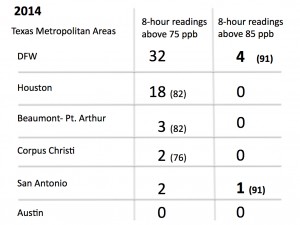 DFW still has a smog problem and all it takes is another hot and dry summer to see it escalate. We need the help more controls on major sources could give us. We need Selective Catalytic Reduction on ALL the Midlothian cement and East Texas coal plants. We need electrification of gas compressors in the Barnett Shale. This should be the message to both the TCEQ and EPA during the public hearing in January.
DFW still has a smog problem and all it takes is another hot and dry summer to see it escalate. We need the help more controls on major sources could give us. We need Selective Catalytic Reduction on ALL the Midlothian cement and East Texas coal plants. We need electrification of gas compressors in the Barnett Shale. This should be the message to both the TCEQ and EPA during the public hearing in January.
DFW smog in 2014: we've met the Clinton era standard for now, on the way to trying to get "close enough" to the W Standard, and still very far from a new Obama standard. Don't hang up the gas mask yet.
First-Ever DFW Physician Presentation on Fracking in Mansfield October 29th
 (Mansfield)— A new group of Mansfield residents is sponsoring what’s believed to be the first DFW presentation by a medical doctor on the health effects of fracking as part of a campaign to re-write the city’s six-year old drilling ordinance they say no longer reflects the best science, or provides enough public protection.
(Mansfield)— A new group of Mansfield residents is sponsoring what’s believed to be the first DFW presentation by a medical doctor on the health effects of fracking as part of a campaign to re-write the city’s six-year old drilling ordinance they say no longer reflects the best science, or provides enough public protection.
Mansfield Gas Well Awareness is hosting Dr. Anne Epstein, M.D. at the Mansfield Holiday Inn on October 29th beginning at 7 pm. Dr. Epstein is an internal medicine specialist who graduated from Baylor Medical School and sits on the Lubbock County Board of Health. She’s a member of the Board’s Oil and Gas Advisory Committee that recently voted to recommend setbacks of 1500 feet separating homes, workplaces, and schools from wells. Mansfield currently allows wells as close as 600 feet to residences, with post drilling development up to 100 feet.
“Our 2008 ordinance was written before new scientific studies showing higher rates of birth defects and cancers among those living close to gas wells,” said Tamera Bounds, a member of MGWA. “Like Lubbock, Dallas and other Texas cities that have looked at those studies recently and adjusted their regulations, Mansfield must update its obsolete rules to better protect our families and property values.”
206 gas wells have been drilled in the city of 60,000 in the last six years with the potential to drill 300 more. That’s almost as many as Denton, with twice the population. Almost every Mansfield resident currently lives within a mile of one well or more. However, the Special Use Permits (SUPs) approved by the city expire after five years. SUPs for undrilled wells approved in 2008 and 2009 have already expired or will soon, and MGWA wants the city to take the opportunity to strengthen its drilling ordinance.
“We want to make sure our rules match the new science by allowing for bigger buffer zones, more air pollution controls and better monitoring and emergency response,” said Bounds. She citied 2008 correspondence from a gas well operator to the Mansfield Planning and Zoning Committee that claimed closer distances between schools and wells, as opposed to nursing homes, were justified because “children are very mobile.”
“We need rules based on more than the industry’s estimate of how fast our children can run.”
Among the recent studies cities by Bounds and scheduled to be reviewed by Dr. Epstein are those from the University of Colorado School of Public Health that trace close proximity to gas wells with higher rates of birth defects, and the National Institute of Occupational Safety and Health that discovered benzene and silica levels among workers at drilling sites that exceeded federal exposure limits.
Bounds’ group is being assisted by DFW clean air group Downwinders at Risk, which was instrumental in getting a new Dallas gas ordinance passed in 2013. Downwinders Director Jim Schermbeck says he thinks the Mansfield effort marks a milestone in Tarrant County’s coping with the Barnett Shale drilling boom. “It’s a great example of residents in a city saturated with wells after the first wave of drilling trying to recover and catch up with the science before the next wave makes things a lot worse.”
Schermbeck cautioned that the Mansfield group had an uphill climb considering its current council make-up.
At least two of Mansfield’s city council members are directly involved in the fracking business. Larry Broseh is the president of Drill King International, a manufacturer of drilling equipment, and Stephen Lindsey is Director of Government Affairs of Quicksilver Resources, a natural gas and oil exploration and production company.
Bounds said the group would ask those two council members to recuse themselves from the writing of a new ordinance because of their conflict of interests. “ This needs to be a citizen-driven process. It needs to be a science-driven process. The 2008 ordinance came directly from industry and hardly involved residents at all. This time, things need to be different.”
Blue Stain Removal: Chesapeake’s Julie Wilson Leaves Cowtown Blue Zones Project
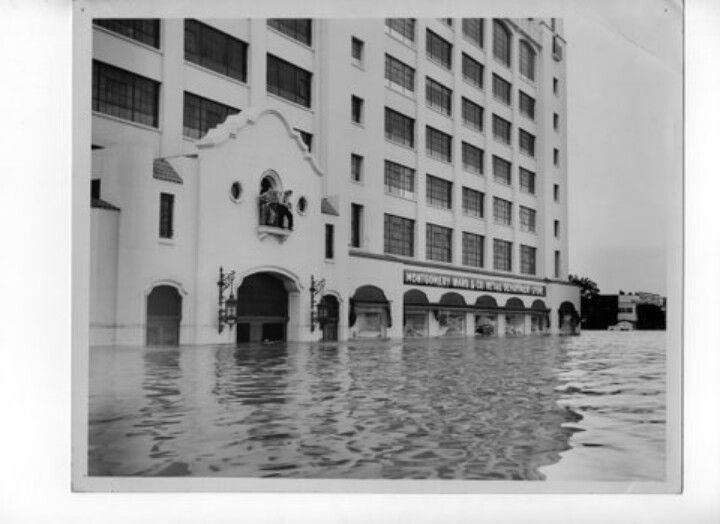 Via the Fort Worth Star-Telegram, it seems the city finally wised up and decided it was not a good match to have the most high-profile promoter of urban gas drilling in Cowtown be the spokesperson for a new "healthy lifestyle" initiative.
Via the Fort Worth Star-Telegram, it seems the city finally wised up and decided it was not a good match to have the most high-profile promoter of urban gas drilling in Cowtown be the spokesperson for a new "healthy lifestyle" initiative.
Last Friday, Healthways announced that former Chesapeake top executive and all-around shill for everything-is wonderful-about drilling, Julie Wilson, had resigned her post as VP for the Fort Worth Blue Zones Project that seeks to promote a dialog about healthier choices for residents. Unfortunately it arrives about eight years too late to initiate a discussion about the wisdom of putting large toxic air polluters next to homes, schools, and parks.
Wilson's appointment to the Zones Project had raised eyebrows and objections even among a mostly quiescent Fort Worth population that had been among the first victims of the fracking boom in the late "Oughts." As in, we ought to have thought about this some more. Blue Zones got sizable blowback over her hiring, and it followed them wherever they showed up for one of their many community meetings, making for uncomfortable distractions to their more mainstream agenda concerning people's smoking, eating and exercise habits.
Wilson's resignation is one more sign of how far Chesapeake's star has fallen in Fort Worth. It's former corporate headquarters on the banks of the Trinity is now owned by Pier 1. Most of its Barnett Shale holdings have been auctioned off for needed cash. Aubrey McClendon, its founder and CEO had to resign last year after a stock scandal. The city and other entities are suing the company for royalties they think they were cheated.
But like the high-watermark from the 1949 flood that lasted for decades on the old Montgomery Wards' warehouse on 7th street, the pollution from its former facilities and stains on Ft. Worth's civic infrastructure from Chesapeake's invasion remain to remind everyone just how badly Fort Worth was rolled by the company.
McCarthyism in the Gas Field: Second RRC Commissioner Says Russia to Blame for Fracking Opposition
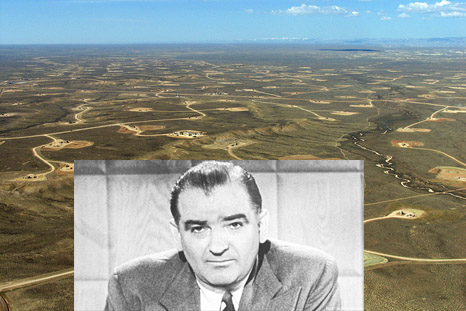 A second member of the Texas Railroad Commission has accused US fracking opponents of being financed by Russian gas interests. That makes two out of three. Your immediate reaction may be: "Oh yeah, Where's my check?" But Davis Porter is serious, and in making the charge, Porter is walking a fine line in seriously slandering Josh Fox and others with his reckless accusation, which has everything it needs except, you know, proof.
A second member of the Texas Railroad Commission has accused US fracking opponents of being financed by Russian gas interests. That makes two out of three. Your immediate reaction may be: "Oh yeah, Where's my check?" But Davis Porter is serious, and in making the charge, Porter is walking a fine line in seriously slandering Josh Fox and others with his reckless accusation, which has everything it needs except, you know, proof.
Porter made the claim in a snappy press release entitled “Porter Exposes Putin Plot to Hurt Texas Economy,” that jumps from the fact that the Russian gas giant Gazprom has hired a US public relations company to try and soften the impacts of sanctions over the Ukraine crisis into a dark and secret conspiracy to promote home grown fracking opposition. Believing this story would first require the laughable leap of faith that the PR firm's go-to Gazprom lobbyists, former GOP Senate hardliner Trent Lott (R- Mississippi) and Blue Dog Democrat John Breaux (D – Louisiana), are turning their backs on big business in their own states and hanging out with the cast of Gasland. Not bloody likely.
But that's not stopping Porter. In his press release he says the Russians are using the PR partnership not to get out from under pressing US sanctions for their illegal invasion of another country, but "to spread unsupported propaganda about the environmental and health risks of the practice of fracking."
Citing a dire warning he's already sent via a very serious letter to Secretary of State John Kerry, Porter reveals that Moscow's "apparent strategy includes funding anti-hydraulic fracturing environmental organizations, placing misinformation in the public, and even mass media propaganda — namely their assistance with the distribution of Gasland, an incredibly deceitful film about hydraulic fracturing in America."
Porter uses wire reports about the PR firm's hiring to make explicit what RRC Commissioner Barry Smitherman only artfully hinted at in his letter to the marathon Denton City Council meeting in July over the debate on a fracking ban in that city – that US anti-fracking activists are being financed by the Russkies.
There's only one problem, none of the news reports about the hiring of the PR firm has mentioned fracking, even in passing. Even in footnotes.
To make that strained connection, Porter relies on an undated piece by one Keith C Smith who was with a think tank outfit called the Center for Strategic and International Studies. Smith cites nefarious Russian influence in Bulgaria's decision to ban fracking and German business ties to Russian gas to suggest that there's a master plan to leave Russia as the sole provider of natural gas to Europe and freeze out US imports.
Will you be at all surprised to learn that Mr. Smith has been "a consultant to several energy companies?"
To its credit, the Texas Tribune, which broke the story, asked Porter for specific examples showing Gazprom was funding anti-fracking efforts in America. Porter’s spokeswoman Mary Bell said in an email: There are multiple news reports citing Gazprom's influence and efforts in the EU and the US. Some are linked in the letter.” She means the Smith article, which shows absolutely no influence on US anti-fracking activities, and the news reports about the recent hiring of the PR firm to help the Russians avoid sanctions, but mentions nothing about fracking.
See how that works? First, we have a piece by an energy company consultant that says he strongly suspects Russian influence in the Bulgarian fracking ban, but can't prove it. Next, Gazprom hires a PR firm to avoid the repercussions of sanctions over the Ukraine invasion. Ergo, Russia's "influence and efforts in the EU and US" are plain as day.
When he was asked by the Tribune as to Russian influence in Denton's fracking vote, Porter spokeswoman Bell said that “the commissioner's comments are not specific to Denton,” but “Gazprom is spending tens of millions of dollars — that we know of — to eliminate competition globally. It's likely they've influenced much of the anti-hydraulic fracturing movement's message.”
Students of history know this is exactly how McCarthyism works – by innuendo instead of fact. Indeed, the Wikipedia definition of McCarthyism is "the practice of making accusations of disloyalty, subversion, or treason without proper regard for evidence." It also means "the practice of making unfair allegations or using unfair investigative techniques, especially in order to restrict dissent or political criticism."
Commissioner, have you no sense of decency, sir? At long last, have you left no sense of decency?
Feds: Fracking Site Tests Show 15 of 17 Employees Exceeded Benzene Exposure Limits
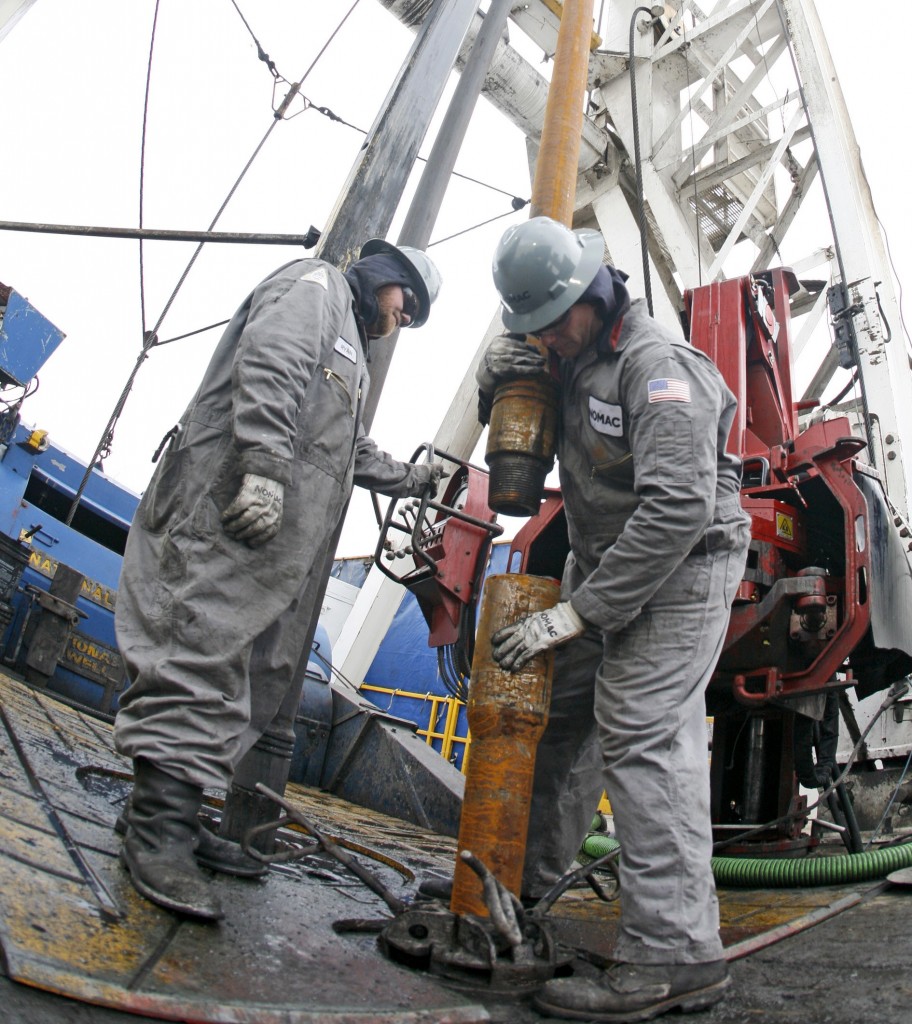 On Labor Day we wrote about the fact that workers employed by polluters are often as much at risk from exposure to the polluters' poisons as near-by homeowners. A new peer-reviewed study of six fracking sites in Colorado and Wyoming published by the National Institute of Occupational Heath and Safety (NIOSH) is fresh proof of this, showing 15 of 17 tests for Benzene exposure among workers who were monitoring on-site fracking well "flowback" exceeded the federal eight-hour exposure limit.
On Labor Day we wrote about the fact that workers employed by polluters are often as much at risk from exposure to the polluters' poisons as near-by homeowners. A new peer-reviewed study of six fracking sites in Colorado and Wyoming published by the National Institute of Occupational Heath and Safety (NIOSH) is fresh proof of this, showing 15 of 17 tests for Benzene exposure among workers who were monitoring on-site fracking well "flowback" exceeded the federal eight-hour exposure limit.
The study looked at drill site workers who use a gauge to measure the amount of "flowback" water that returns after a frack job is initiated. Flowback is the regurgitation of the fracking fluids from the well itself. It's collected on the surface after hydraulic fracturing is completed.
Benzene is a known carcinogen that's routinely present in fracking flowback water. It’s the same poison found in gasoline, cigarette smoke and a lot of chemical manufacturing and refining. It's been directly linked or associated with leukemia and other conditions, such as Acute Myelogenous Leukemia (AML), Chronic Myelogenous Leukemia (CML), Acute Lymphocytic Leukemia (ALL), Chronic Lymphocytic Leukemia (CLL), Hairy Cell Leukemia (HCL), Non-Hodgkin’s Lymphoma, Multiple Myeloma, Myelodysplastic Syndrome (MDL), Myelofibrosis and Myeloid Metaplasia, Aplastic Anemia and Thrombocytopenic Purpura.
